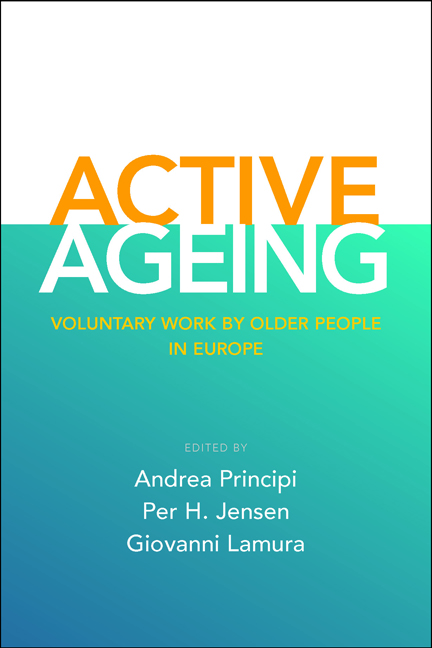Book contents
- Frontmatter
- Contents
- List of tables and figures
- Notes on the contributors
- Acknowledgements
- Foreword
- Part I Realising volunteering by older people in Europe An overarching approach
- Part II Opportunities and restrictions for older volunteers National experiences
- Part III Opportunities and restrictions for older volunteers Case studies in European voluntary organisations
- Part IV Conclusions
- Index
Foreword
Published online by Cambridge University Press: 05 March 2022
- Frontmatter
- Contents
- List of tables and figures
- Notes on the contributors
- Acknowledgements
- Foreword
- Part I Realising volunteering by older people in Europe An overarching approach
- Part II Opportunities and restrictions for older volunteers National experiences
- Part III Opportunities and restrictions for older volunteers Case studies in European voluntary organisations
- Part IV Conclusions
- Index
Summary
This comprehensive book presents a unique and critical discussion of issues associated with older volunteers across eight different European countries. Its significance lies in its comparative analyses across diverse countries and contexts, and its attention to the contemporary challenges and changes faced by individuals, organisations and government policy in an era of population ageing. Fundamentally, this book asks the key and pertinent question, what can be done to enhance volunteering by older people in a diverse and changing world?
Volunteering is a complex social phenomenon, which has certainly been around for a long time. However, it has been described as an activity that has long been under-estimated, under-researched and under-valued. Studies on employment and the paid work context fill volumes of journals and whole libraries of books, but it is only much more recently that volunteering has been seen as a subject worthy of study.
The importance of volunteering and its relationship to other domains such as the state, the market and the family is increasingly being acknowledged. Volunteering has received some attention through the International Year of Volunteers in 2001 and the ensuing International Year of Volunteering +10 in 2011. Promotion by bodies such as the United Nations has encouraged many national governments to look at their approaches to volunteers and volunteering.
Within this context, the issue of older volunteers is particularly significant. Due to global population ageing, issues associated with a growing proportion of healthy older people are hitting the headlines. Older people are increasingly acknowledged as a segment of the population with much to offer, and volunteering is seen as a viable and positive option for many to keep them active and involved. Yet despite this, there is still a lack of good, comparative literature that investigates this phenomenon in depth and within its social, political and economic context.
This is the enormous value and contribution of this book. It focuses exclusively on older volunteers across different European countries with their diverse traditions and contexts, using active ageing, a key European Union (EU) policy approach, as an overarching theoretical frame. Furthermore, it does so using a conceptual framework that explores all levels of analysis: micro (individuals), meso (organisations), macro (policy and legal context) and structural (welfare regimes). It therefore contributes to knowledge in all of these areas, and as such provides a thoroughly comprehensive view of volunteering by older people.
- Type
- Chapter
- Information
- Active AgeingVoluntary Work by Older People in Europe, pp. xv - xviPublisher: Bristol University PressPrint publication year: 2014

